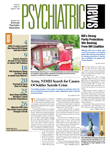A family history of rheumatoid arthritis, type 1 diabetes mellitus, or celiac disease is associated with a higher risk of developing autism spectrum disorders in children, a recent study found.
A group of Danish and U.S. researchers collected medical data on all children born in Denmark to Danish mothers between 1993 and 2004 and matched these children with their parents' and siblings' hospital records. Any diagnoses of autoimmune diseases identified before the children were diagnosed with an autism spectrum disorder were analyzed for possible correlations with the children's risk for such a disorder.
Among 689,196 children, 3,325 had a diagnosis of an autism spectrum disorder. Rheumatoid arthritis in mothers was associated with a 70 percent increase in the risk of autism spectrum disorders in children (risk ratio 1.70, 95 percent confidence interval [CI] 1.07 to 2.54). Mothers' celiac disease was associated with nearly three times the risk of autism spectrum disorders compared with children of mothers who did not have celiac disease (risk ratio 2.97, 95 percent CI 1.27 to 5.75). Family history of type 1 diabetes, with parents and siblings included, was associated with a statistically significant increase in the risk of the childhood autism diagnosis (risk ratio 1.78, 1.16 to 2.61), but not the risk of the overall class of autism spectrum disorders.
These risk associations remained statistically significant even after the authors limited the analyses to children who were born neither pre-term nor underweight and who had no obvious distress at birth (Apgar score above 6). This suggests that the observations cannot be entirely explained by detrimental effects on the fetus due to the mother's autoimmune disease. Combined with other research evidence, the authors speculated that certain autoimmune diseases may share a common genetic root with autism.
Other autoimmune diseases, such as multiple sclerosis, psoriasis, and Crohn's disease, in parents and siblings were not significantly associated with autism spectrum disorders in the study children. Furthermore, a family history of thyrotoxicosis was the only autoimmune disease studied that was associated with a lower risk of autism spectrum disorder.
The study was published in the August Pediatrics and was funded by grants from the U.S. National Institute of Mental Health and the Aarhus University Research Foundation in Denmark.
Because of the nationalized health care and central medical registries in Denmark, decades of complete medical data of all Danish citizens in the databases provide a valuable resource for epidemiologic research. In a study published in the February 21, 2004, British Medical Journal, Eaton and colleagues found that a parental history of celiac disease was associated with increased risk of schizophrenia in offspring, also using the Danish national health care registries.
Celiac disease is an often-undiagnosed autoimmune disease triggered by gluten in wheat-containing foods. Patients usually suffer from gastrointestinal symptoms and nutritional deficiencies because the intestinal linings are attacked and damaged by immune responses to even a minute amount of gluten intake. According to a recent Mayo Clinic study, the prevalence of celiac disease has increased fourfold from the 1950s. The study was published in the July Gastroenterology. The reason for the trend remains unknown.
